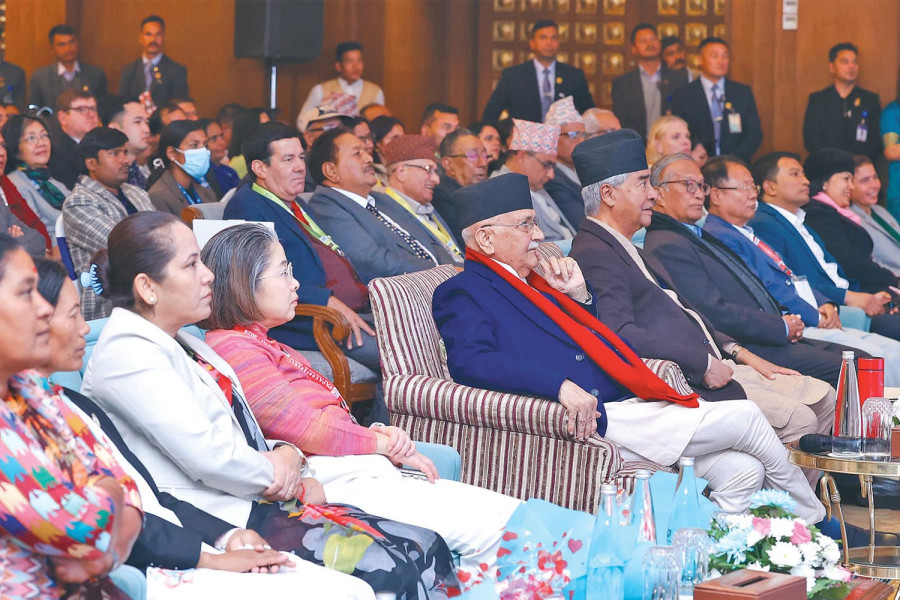National
Global experts descend on Kathmandu to discuss demographic shifts in Asia
The conference will feature 400 working papers across 17 thematic sessions and two panel discussions.
Post Report
Nepal is hosting the Asian Population Association (APA) conference, a four-day international event that began on Wednesday at Soaltee Hotel, Kathmandu.
The conference was organised by the Central Department of Population Studies (CDPS), Tribhuvan University, in collaboration with the Ministry of Health and Population (MoHP), the United Nations Population Fund (UNFPA) Nepal, Population Association of Nepal (PAN), and the Centre for Research on Environment Health and Population Activities (CREHPA).
The event has brought together over 500 experts and policymakers from 35 countries to discuss key demographic issues in Asia.
Prime Minister KP Sharma Oli inaugurated the conference with a virtual interaction with Mina Shrestha, a new mother at KMC Hospital, Sinamangal. Extending his wishes for the health and well-being of both the mother and her newborn, Oli stressed the importance of the conference in global discussions on demographic dynamics.
Yogendra Bahadur Gurung, head of the department, said that the conference was previously held in cities such as New Delhi, Bangkok, Kuala Lumpur, Shanghai, and Jakarta, and that selection of Kathmandu as a venue for the international event represents Nepal’s growing prominence in population studies.
“Hosting the 6th APA conference in Nepal is a privilege, especially at a time when the country is experiencing a crucial demographic transition,” added Gurung.
The conference comes at a time when Nepal’s population structure is shifting, as reflected in the 2021 Population and Housing Census.
The country has achieved replacement-level fertility, reduced infant mortality rates, and increased life expectancy to 71.3 years.
Gurung said, “The child population has decreased to 27.8 percent, while the working-age population has risen to two-thirds, with a declining dependency ratio of 53.3 percent.”
According to him, these indicators place Nepal in a “demographic window of opportunity” to reap the demographic dividend.
However, some challenges remain.
Emigration among economically active males limits domestic production, maternal mortality rates remain high, and child marriage persists. Urban centres like Kathmandu and Pokhara are grappling with overcrowding, while rural areas face depopulation.
Experts warn that Nepal’s current demographic window of opportunity could close without strategic actions.
“While our dependency ratio is declining, high emigration among working-age males and regional population imbalances due to urbanisation demands a clear population and migration management policy,” Gurung said.
Across Asia, ageing populations are a growing concern, said Reiko Hayashi, president of the APA. Countries like Japan, where one-third of citizens are over 65, face challenges in adapting welfare systems and economies to support older adults.
The global fertility rate of 2.2 further complicates the scenario, said Hayashi. In East Asia, Europe, and Northern America, over 20 percent of the population is aged 65 or older.
Prime Minister Oli noted that Nepal is also transitioning into an aging society, with 10 percent of its population now over 60. “Ageing individuals should never be regarded as a burden but as a natural consequence of societal progress,” Oli said.
Oli cautioned against unnecessarily limiting births urging a balanced approach to population policies. “The policy of ‘we two, ours two’ can still play a constructive role in shaping sustainable population management,” he said.
Oli also highlighted Nepal’s uneven population distribution, with 54 percent residing in the plains (the southern-belt) and only 6 percent in the mountains. “The mountains have become havens for wildlife, while the plains face the strain of overpopulation,” he said. “We must not overlook the correlation between development and population density.”
The conference will feature 400 working papers across 17 thematic sessions, two-panel discussions, and a special session on Nepal. Topics include aging, urbanisation, migration, gender issues, and public health.
UNFPA country representative for Nepal, Won Young Hong, praised Nepal as an ideal host. “Nepal’s socio-economic context has evolved since its last population policy. This conference will contribute to shaping a new, evidence-based policy,” she added.
The output of the discussions from the conference will aid in preparing Nepal’s new population policy which is under discussion by the MoHP.
“Population should be at the centre of all policies for inclusive development,” Gurung said. “It must be well institutionalised by the government to achieve the goal of ‘Prosperous Nepal and Happy Nepali’.”




 10.12°C Kathmandu
10.12°C Kathmandu














